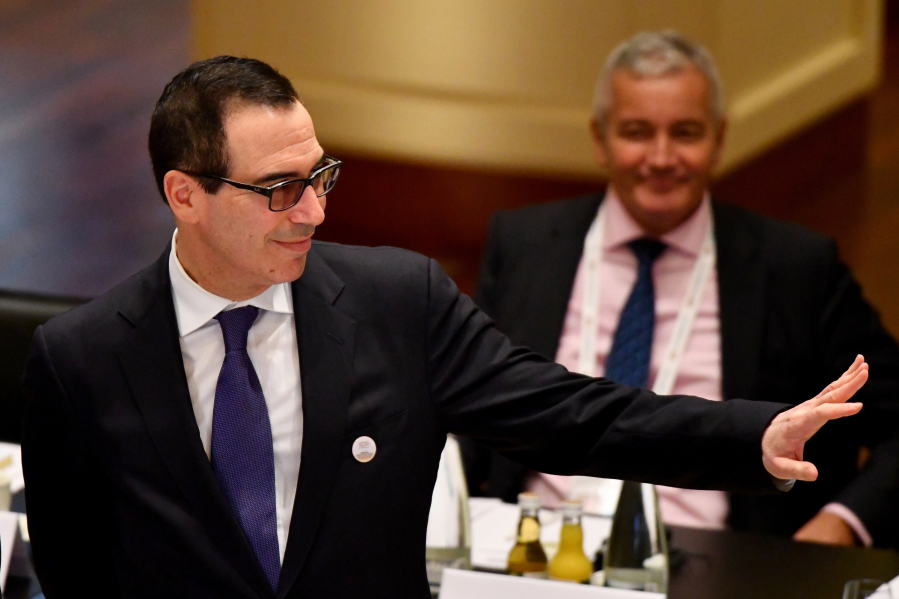WASHINGTON — In the century that Pat Snook’s family has run a cattle operation in southeast Texas, she and her relatives have paid the federal estate tax three times to account for acreage, equipment and other assets being passed from one generation to the next.
The 72-year-old is hoping there is never a fourth.
“You don’t mind paying it one time,” said Snook, who lives in Livingston, about an hour northeast of Houston. “But you don’t want to pay it three times on the same property and the same equipment and the same tractors. It’s just not right.”
Republicans may give Snook her wish, as tax revamps moving through the House and Senate would eliminate the estate tax or curtail it in a major way.
But even as the GOP focuses on how the “death tax” harms family farms and small businesses, any softening of the levy would also boost America’s wealthiest taxpayers. Among them is President Donald Trump, whose real estate empire could one day be subject to the estate tax.
And that dynamic is driving debate on a rollback that Democrats see as a favor to the rich.
Consider the stats: Only a few thousand estates pay the tax each year, thanks to a large carve-out and other deductions. Only a fraction are small farms or closely held businesses. The top 10 percent of earners, meanwhile, will pay almost all of the $20 billion in annual estate tax revenue.
“Those are Donald Trump’s personal dips,” said Austin Rep. Lloyd Doggett, a senior Democrat on the House Ways and Means Committee. “And those are big dips.”
Some form of the estate tax has existed in the U.S. for decades.
The current setup taxes estates on assets worth more than $5.49 million at the time of the owner’s death. The top statutory rate is 40 percent, though most estates end up paying a lower effective rate than that. That’s because of perks like an unlimited charitable deduction.
The levy — designed to prevent concentrations of wealth — serves as a backstop of sorts to counter families not having to pay capital gains taxes on many investments that are passed on.
The House GOP’s tax plan would eliminate the tax after six years, while still also allowing estate beneficiaries to not pay those capital gains taxes. In the Senate, Republicans are proposing to keep the estate tax but double the exemption to $11 million.
Either approach would continue efforts to chip away at what Republicans see as unfair double taxation. In 1977, the tax’s exemption was about $121,000, while the top statutory rate was 70 percent. Nearly 140,000 estates filed a return. But the exemption keeps rising — ahead of inflation. The top rate keeps dropping. And the revenue produced by the tax has leveled off.
“Republicans figure that by shrinking the amount of people who are subject to the tax, they are going to make the revenue less and less and they are going to make it seem more arbitrary,” said Ray Madoff, a tax law expert at Boston College Law School.
But that long-term trend hasn’t diminished the partisan divide, as Texas Sen. Ted Cruz and Vermont Sen. Bernie Sanders proved last month in a televised CNN showdown.
Sanders, who ran for president as a Democrat, accused the GOP of pushing an “incredible boondoggle” to favor mega-donors Charles and David Koch and other uber-rich Americans. Cruz, a Republican, spoke at length about the costly strain felt by family farmers and ranchers.
“Ted, that’s a good speech,” Sanders said after Cruz’s reflection on rural life.
“Thank you,” Cruz interjected.
“But it has nothing to do with reality,” Sanders continued.
The Vermont senator’s point? The Urban-Brookings Tax Policy Center says just 80 small farms and businesses will pay the estate tax this year. “Small” is defined as estates with farm and business assets making up at least half of the gross estate and totaling no more than $5 million.
And even Treasury Secretary Steven Mnuchin has acknowledged the stats.
“Obviously, the estate tax, I will concede, disproportionately helps rich people,” Mnuchin, who is among the extraordinarily wealthy members of Trump’s Cabinet, said of the repeal proposal.
But Snook, the Texas rancher, says the estate tax burden is all too real.
She doesn’t dispute that her family’s holdings add up: the herd of 450 mama cows, the 1,500-acre ranch and other property, the farm equipment that totals hundreds of thousands of dollars. She balks, however, at the notion that her family fits any glamorous definition of rich.
“We don’t drive Cadillacs or a Lexus,” said Snook, whose son-in-law now manages much of the operation. “We drive Chevy pickups.”
The rancher said the prospect of someday paying the estate tax — yet again — means putting off the purchase of new equipment and keeping other stuff “together with baling twine.” The dilemma has been the rallying cry for Rep. Kevin Brady, the House’s top tax writer.
“The damage from the estate tax isn’t on those who pay it,” said Brady, a Republican from The Woodlands who often recounts Snook’s story. “The damage is everything our family-owned farmers and businesses have to do to avoid it.”
But some have suggested a simpler solution: Craft a specific exemption for family farms and businesses.
That design might address the concerns of ranchers like Snook. It might also alleviate the worries of repeal critics, who contend that elimination of the estate tax would just allow the wealthy to get wealthier while also hurting charitable giving that comes through end-of-life gifts.
But that option doesn’t appear to be in the works, particularly as other issues in the GOP’s tax plans are consuming more time and energy. And as GOP tax plans hurtle forward, Snook and others who want the estate tax gone are taking a wait-and-see approach.
“I don’t know if they are ever going to get into agreement,” she said.



